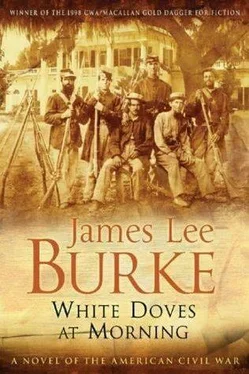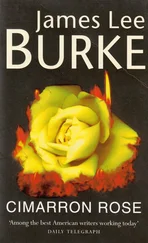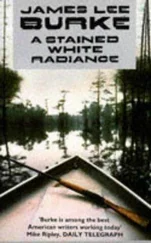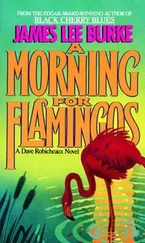Rufus Atkins' eyes were flat, hazel, and rarely did they contain or reveal any definable emotion, as though he lived behind glass and the external world never registered in a personal way on his senses.
A second man dismounted, this one blond, his nose wind-burned, wearing a leather cap and canvas coat and a red-and-white-checkered scarf tied around his throat. On his hip he carried a small flintlock pistol that had three hand-smoothed indentations notched in the wood grips. In his right hand he gripped a horse quirt that was weighted with a lead ball sewn inside the bottom of the deerhide handle.
"She done dropped it, huh?" he said.
"That's keenly observant of you, Clay, seeing as how the woman's belly is flat as a busted pig's bladder," Rufus Atkins replied.
"Marse Jamison says find both of them, he means find both of them, Rufus," the man named Clay said, looking back into the trees at the blood spots in the snow.
Rufus Atkins squatted down and ignored his companion's observation, his eyes wandering over Sarie's face.
"They say you filed your teeth into points 'cause there's an African king back there in your bloodline somewhere," he said to her. "Bet you gave birth to a man-child, didn't you, Sarie?"
"My child and me gonna be free. Ain't your bidness no more, Marse Rufus," she replied.
"Might as well face it, Sarie. That baby is not going to grow up around here, not with Marse Jamison's face on it. He'll ship it off somewhere he doesn't have to study on the trouble that big dick of his gets him into. Tell us where the baby is and maybe you and it will get sold off together."
When she didn't reply to his lie, he lifted her chin with his knuckle. "I've been good to you, Sarie. Never made you lift your dress, never whipped you, always let you go to the corn-breaks and the dances. Isn't it time for a little gratitude?" he said.
She looked into the distance at the bluffs on the far side of the river, the steam rising off the water in the shadows below, the live oaks blowing stiffly against the sky. Rufus Atkins fitted his hand under her arm and began to lift her to her feet.
She seized his wrist and sunk her teeth into his hand, biting down with her incisors into sinew and vein and bone, seeing his head pitch back, hearing the squeal rise from his throat. Then she flung his hand away from her and spat his blood out of her mouth.
He staggered to his feet, gripping the back of his wounded hand.
"You nigger bitch," he said.
He ripped the quirt from his friend's grasp and struck her across the face with it. Then, as though his anger were insatiable and fed upon itself, he inverted the quirt in his hand and whipped the leaded end down on her head and neck and shoulders, again and again.
He threw the quirt to the ground, squeezing his wounded hand again, and made a grinding sound with his teeth.
"Damn, I think she went to the bone," he said.
"Rufus?" the blond man named Clay said.
"What?" he answered irritably.
"I think you just beat her brains out."
"She deserved it."
"No, I mean you beat her brains out. Look. She's probably spreading her legs for the devil now," the blond man said.
Rufus Atkins stared down at Sarie's slumped posture, the hanging jaw, the sightless eyes.
"You just cost Marse Jamison six hundred dollars. You flat put us in it, Roof," Clay said.
Rufus cupped his mouth in hand and thought for a minute. He turned and looked at the third member of their party, a rodent-faced man in a buttoned green wool coat and slouch hat strung with a turkey feather. He had sores on his face that never healed, breath that stunk of decaying teeth, and no work history other than riding with the paddy rollers, a ubiquitous crew of drunkards and white trash who worked as police for plantation interests and terrorized Negroes on the roads at night.
"What you aim to do?" Clay asked.
"I'm studying on it," Rufus replied. He then turned toward the third man. "Come on up here, Jackson, and give us your opinion on something," he said.
The third man approached them, the wind twirling the turkey feather on his hat brim. He glanced down at Sarie, then back at Rufus, a growing knowledge in his face.
"You done it. You dig the hole," he said.
"You got it all wrong," Rufus said.
He slipped the flintlock pistol from Clay's side holster, cocked it, and fired a chunk of lead the size of a walnut into the side of Jackson's head. The report echoed across the water against the bluffs on the far side.
"Good God, you done lost your mind?" Clay said.
"Sarie killed Jackson, Clay. That's the story you take to the grave. Nigger who kills a white man isn't worth six hundred dollars. Nigger who kills a white man buys the scaffold. That's Lou'sana law," he said.
The blond man, whose full name was Clay Hatcher, stood stupefied, his nose red in the cold, his breath loud inside his checkered scarf.
"Whoever made the world sure didn't care much about the likes of us, did He?" Rufus said to no one in particular. "Bring up Jackson's horse and get him across the saddle, would you? Best be careful. I think he messed himself."
AFTER she was told of her daughter's death and the baby who had been abandoned somewhere deep in the woods, Sarie's mother left her job in the washhouse without permission and went to the site where her daughter had died. She followed the blood trail back to the slough, then stood on the thawing mudflat and watched the water coursing southward toward the river and knew which direction Sarie had been going when she had finally been forced to stop and give birth to her child. It had been north, toward the river called the Ohio.
Sarie's mother and a wet nurse with breasts that hung inside her shirt like swollen eggplants walked along the banks of the slough until late afternoon. The sun was warm now, the trees filled with a smoky yellow light, as though the ice storm had never passed through Ira Jamison's plantation. Sarie's mother and the wet nurse rounded a bend in the woods, then saw footprints leading up to a leafy bower and a lean-to whose opening was covered with a bright green branch from a slash pine.
The child lay wrapped in a blanket like a caterpillar inside a cocoon, the eyes shut, the mouth puckered. The ground was soft now, scattered with pine needles, and among the pine needles were wild-flowers that had been buried under snow. Sarie's mother unwrapped the child from the blanket and wiped it clean with a cloth, then handed it to the wet nurse, who held the baby's mouth to her breast and covered it with her coat.
"Sarie wanted a man-child. But this li'l girl beautiful," the wet nurse said.
"She gonna be my darlin' thing, too. Sarie gonna live inside her. Her name gonna be Spring. No, that ain't right. Her name gonna be Flower," Sarie's mother said.
IN THE spring of 1861 Willie Burke's dreams took him to a place he had never been and to an event he had not experienced. He saw himself on a dusty Texas road south of Goliad, where the wind was blowing in the trees and there was a hint of salt water or distant rain in the air. The soldiers around him were glad of heart, their backs strung with blanket rolls and haversacks, some of them singing in celebration of their impending freedom and passage aboard a parole ship to New Orleans.
Then their Mexican warders began forming up into squads, positioning themselves on one side of the road only, the hammers to their heavy muskets collectively cocking into place.
"Them sonsofbitches are gonna shoot us. Run for hit, boys," a Texas soldier shouted.
"Fuego!" a Mexican officer shouted.
The musket fire was almost point-blank. The grass and tree trunks alongside the road were striped with blood splatter. Then the Mexicans bayoneted the wounded and fallen, smashing skulls with their musket butts, firing with their pistols at the backs of those still trying to flee. In the dream Willie smelled the bodies of the men piled on top of him, the dried sweat in their clothes, the blood that seeped from their wounds. His heart thundered in his chest; his nose and throat were clotted with dust. He knew he had just begun his last day on Earth, here, in the year 1836, in a revolution in which no Irishman should have had a vested interest.
Читать дальше












